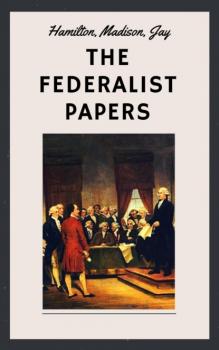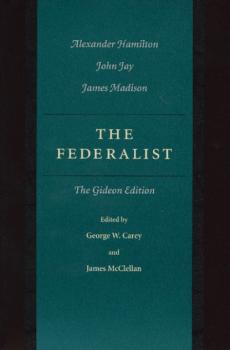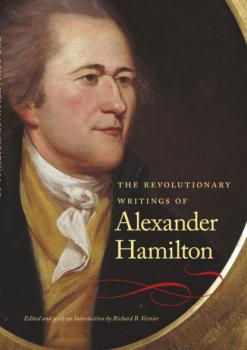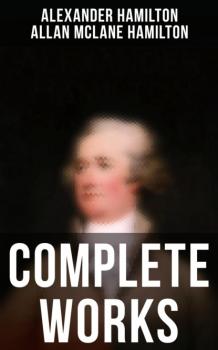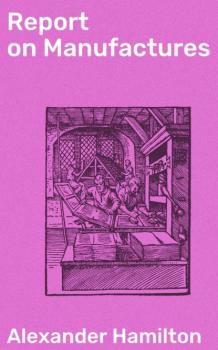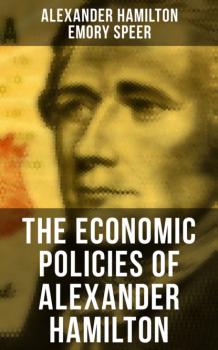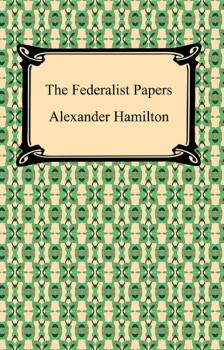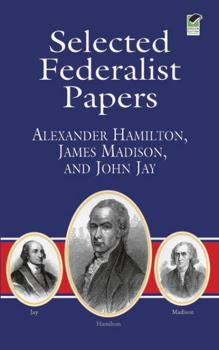Hamilton Alexander
Список книг автора Hamilton AlexanderThe Federalist Papers (Unabridged English Edition)
"After an unequivocal experience of the inefficacy of the subsisting federal government, you are called upon to deliberate on a new Constitution for the United States of America. The subject speaks its own importance; comprehending in its consequences nothing less than the existence of the Union, the safety and welfare of the parts of which it is composed, the fate of an empire in many respects the most interesting in the world."
"The Federalist Papers" is a collection of 85 articles and essays written by Alexander Hamilton, James Madison, and John Jay under the pseudonym «Publius» to promote the ratification of the United States Constitution. The articles of «The Federalist Papers» were first published in 1787 und 1788.
The Federalist
The Federalist, by Alexander Hamilton, James Madison, and John Jay, constitutes a text central to the American political tradition. Written and published in newspapers in 1787 and 1788 to explain and promote ratification of the proposed Constitution for the United States, which were then bound by the Articles of Confederation, The Federalist remains of singular importance to students of liberty around the world.George W. Carey was Professor of Government at Georgetown University and editor of The Political Science Reviewer.James McClellan (1937–2005) was James Bryce Visiting Fellow in American Studies at the Institute of United States Studies, University of London. Please note: This title is available as an ebook for purchase on Amazon, Barnes and Noble, and iTunes.
The Revolutionary Writings of Alexander Hamilton
Alexander Hamilton, trusted military aide and secretary to General George Washington, wrote to persuade. He had the ability to clarify the complex issues of his time without oversimplifying them. From the basic core values established in his earlier writings to the more assertive vision of government in his mature work, we see how Hamilton’s thought responded to the emerging nation and how the nation was shaped by his ideas. This comprehensive collection of his early writings, from the period before and during the Revolutionary War, provides a fuller understanding of the development of his thinking.Richard B. Vernier is Adjunct Professor of American History at Purdue University at Calumet.Joyce Appleby is Professor Emerita of History at UCLA. Please note: This title is available as an ebook for purchase on Amazon, Barnes and Noble, and iTunes.
On the constitutionality of a national bank
"On the constitutionality of a national bank" by Alexander Hamilton. Published by Good Press. Good Press publishes a wide range of titles that encompasses every genre. From well-known classics & literary fiction and non-fiction to forgotten−or yet undiscovered gems−of world literature, we issue the books that need to be read. Each Good Press edition has been meticulously edited and formatted to boost readability for all e-readers and devices. Our goal is to produce eBooks that are user-friendly and accessible to everyone in a high-quality digital format.
Complete Works
Musaicum Books presents to you this meticulously edited collection of Alexander Hamilton's complete works: The Intimate Life of Alexander Hamilton by Allan McLane Hamilton Alexander Hamilton Life Chronology Early Papers and Speeches The Continentalist Writings and Speeches in Federal Convention Writings and Speeches in Convention of New York Addresses Letters of H. G. Writings and Speeches on Taxation and Finance Papers on National Bank Papers on Coinage and the Mint Papers on Industry and Commerce Writings and Speeches on Commercial Relations Writings and Speeches on Foreign Relations Foreign Policy Papers The Whiskey Rebellion Papers Military Papers Miscellaneous Papers Private Correspondence The Federalist Papers
Report on Manufactures
"Report on Manufactures" by Alexander Hamilton. Published by Good Press. Good Press publishes a wide range of titles that encompasses every genre. From well-known classics & literary fiction and non-fiction to forgotten−or yet undiscovered gems−of world literature, we issue the books that need to be read. Each Good Press edition has been meticulously edited and formatted to boost readability for all e-readers and devices. Our goal is to produce eBooks that are user-friendly and accessible to everyone in a high-quality digital format.
The Economic Policies of Alexander Hamilton
This eBook has been formatted to the highest digital standards and adjusted for readability on all devices. It presents Alexander Hamilton's views on American economy. As the first Secretary of the Treasury, Hamilton was the main author of the economic policies of the George Washington administration. He took the lead in the funding of the states' debts by the Federal government, as well as the establishment of a national bank, a system of tariffs, and friendly trade relations with Britain. His vision included a strong central government led by a vigorous executive branch, a strong commercial economy, with a national bank and support for manufacturing, plus a strong military. Contents: Writings and Speeches on Taxation and Finance Papers on National Bank Papers on Coinage and the Mint Papers on Industry and Commerce Writings and Speeches on Commercial Relations Biography of Alexander Hamilton by Emory Speer
The Federalist Papers
"The Federalist Papers" is a collection of writings written by Alexander Hamilton, John Jay, and James Madison. It was written in the late 18th century following the Declaration of Independence of America from England. This work has long since been regarded as a landmark in political science literature as it establishes the basis for the constitutional form of government, which has ruled the United States of America since its inception. While revolutionary at the time «The Federalist Papers» expresses the fundamental rights of man to self-government and the complexities that go with it.
The Federalist Papers (with Introductions by Edward Gaylord Bourne and Goldwin Smith)
Following the signing of the Declaration of Independence there was a vigorous debate in the American colonies on the form of government that should be then established. A Constitutional Convention was convened between May 25th and September 17th, 1787. A principal point in the debate at the convention was as to how much power should be granted to the federal government versus the states. In response to what would come out of this convention a number of “anti-federalist” essays began to proliferate in the press. In order to combat the objections to the new Constitution, Alexander Hamilton organized an effort to write and publish a series of essays that would “endeavor to give a satisfactory answer to all the objections”. This series of essays, which first appeared in three New York newspapers, “The Independent Journal”, the “New-York Packet”, and the “Daily Advertiser”, would come to be known as “The Federalist Papers”. Although the essays were published anonymously, it is believed that Alexander Hamilton wrote the majority of them with James Madison and John Jay contributing the rest. The influence of “The Federalist Papers” on modern democracy cannot be overstated and to this day these writings stand as some of the most important documents regarding the constitutional history of the United States of America. This edition includes introductions by Edward Gaylord Bourne and Goldwin Smith and a biographical afterword of Alexander Hamilton.
Selected Federalist Papers
To persuade undecided New York state voters to ratify the new Constitution of the United States, Alexander Hamilton, James Madison, and John Jay wrote 85 compelling essays, under the title The Federalist and signed «Publius,» that appeared in New York City newspapers in 1787–1788. These far-reaching essays, which comprise a masterful exposition and defense of the proposed federal system of government and of the Constitution's carefully designed system of checks and balances, are today considered a keystone of American democracy. Their continuing relevance was demonstrated by the frequent references to Paper No. 65, «On Impeachments,» during the impeachment proceedings against President Clinton.This volume contains 35 of the most famous and important pieces, including ones that deal with «dangers from foreign arms and influence»; with the need for a federal government able to raise revenues through taxation; with the creation of an electoral college; with freedom of the press and the inadvisability of a bill of rights; with the three-fifths rule for counting slaves; with the objectives and powers of the judiciary; and much else. Of lasting value and interest to students of American history and government, this carefully chosen selection will also fascinate any general reader curious about the history of the Constitution and the beginnings of American federalism.
